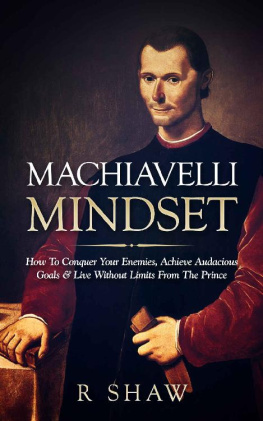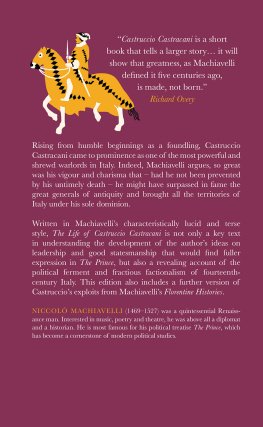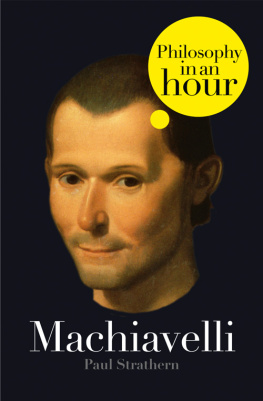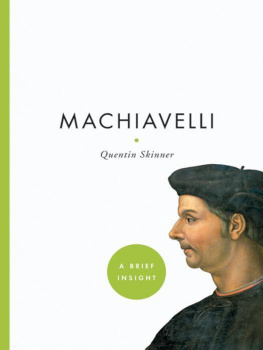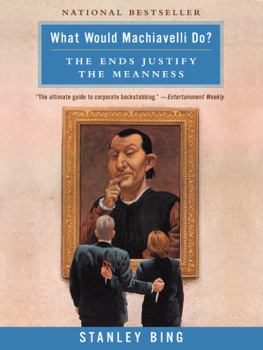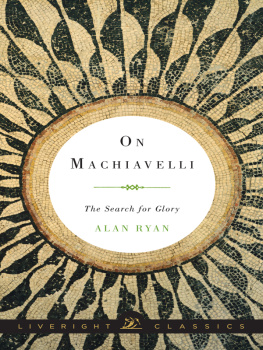Alexander Lee - Machiavelli: His Life and Times
Here you can read online Alexander Lee - Machiavelli: His Life and Times full text of the book (entire story) in english for free. Download pdf and epub, get meaning, cover and reviews about this ebook. year: 2020, publisher: Pan Macmillan, genre: Non-fiction / History. Description of the work, (preface) as well as reviews are available. Best literature library LitArk.com created for fans of good reading and offers a wide selection of genres:
Romance novel
Science fiction
Adventure
Detective
Science
History
Home and family
Prose
Art
Politics
Computer
Non-fiction
Religion
Business
Children
Humor
Choose a favorite category and find really read worthwhile books. Enjoy immersion in the world of imagination, feel the emotions of the characters or learn something new for yourself, make an fascinating discovery.
- Book:Machiavelli: His Life and Times
- Author:
- Publisher:Pan Macmillan
- Genre:
- Year:2020
- Rating:4 / 5
- Favourites:Add to favourites
- Your mark:
- 80
- 1
- 2
- 3
- 4
- 5
Machiavelli: His Life and Times: summary, description and annotation
We offer to read an annotation, description, summary or preface (depends on what the author of the book "Machiavelli: His Life and Times" wrote himself). If you haven't found the necessary information about the book — write in the comments, we will try to find it.
Machiavelli: His Life and Times — read online for free the complete book (whole text) full work
Below is the text of the book, divided by pages. System saving the place of the last page read, allows you to conveniently read the book "Machiavelli: His Life and Times" online for free, without having to search again every time where you left off. Put a bookmark, and you can go to the page where you finished reading at any time.
Font size:
Interval:
Bookmark:

Alexander Lee is a research fellow at the University of Warwick. He is the author of four acclaimed books, most recently Humanism and Empire: The Imperial Ideal in Fourteenth-Century Italy. He writes a regular column for History Today and has contributed articles on a wide variety of historical and cultural subjects to the Sunday Telegraph, the Wall Street Journal, the Guardian, the New Statesman, the Times Literary Supplement and Dissent, and has frequently appeared on BBC television and radio, ITV, Central Television and Sky News. He lives in France.
His Life and Times

To Marie
with all my love
It would be hard to overstate the extent to which our understanding of Niccol Machiavellis life and times has been transformed since the publication of Roberto Ridolfis classic study in 1954. Over the past few decades, a veritable torrent of new biographies has appeared, of which those by Francesco Bausi, Robert Black, Sebastian de Grazia, Maurizio Viroli and Corrado Vivanti deserve particular mention. Thanks to the tireless efforts of scholars such as Sergio Bertelli, Denis Fachard, Jean-Jacques Marchand and Mario Martelli, critical editions of an ever-growing number of Machiavellis works have been made available. And, in almost every field with a bearing on his writings and career, huge strides have been taken. To take just one example, it is fair to say that our approach to his political thought has been revolutionized by those like Erica Benner, Gisela Bock, John Pocock, Quentin Skinner and Gabriele Pedull. In much the same way, Alison Brown, Anna Maria Cabrini, Marcia Colish, Virginia Cox, Carlo Dionisotti, Victoria Kahn, Brian Richardson and Gennaro Sasso to name but a few have not only cast fresh light on his literary, dramatic and historical works, but have also enriched our knowledge of his use of rhetoric, his engagement with the Latin classics and even his attitude towards gender. So, too, our understanding of the turbulent world of Florentine politics has been recast by the pioneering work of Nicolai Rubinstein, Humphrey Butters, John Najemy and John Stephens, while our perceptions of the Italian Wars and Machiavellis role in them have been turned on their head by Mikael Hrnqvist, Michael Mallett and Catherine Shaw. And, every day, new and important discoveries continue to be made.
This biography cannot hope to equal, let alone surpass the remarkable contributions which have been made to Machiavellian scholarship over the past seventy years. Nor, as a consequence, does it attempt to advance an especially radical vision of its subject. Instead, its aim is to bring together the insights of recent years to provide as detailed, accessible and comprehensive a portrait of Machiavellis life and times as possible. As the endnotes testify, my debt to those who have gone before me is immense, especially insofar as Il principe and the Discorsi are concerned, but I have not hesitated to suggest new interpretations where I have thought it appropriate, to shine a light into those corners of Machiavellis life which have hitherto remained in shadow, and to make his day-to-day existence as vivid and immediate as the evidence allows. Throughout, my approach has been guided by three over-arching considerations.
The first is context. In the recognition that Machiavellis intellectual and personal development can only be seen clearly in the mirror of his own times, I have been at pains to situate him firmly in the culture, society and politics of late fifteenth- and early sixteenth-century Italy more firmly, I believe, than has sometimes been the case in the past. Naturally, I have paid particularly close attention to the ebb and flow of the Italian Wars, the constitutional wrangling by which Florence was beset and the bitter divisions by which the city was wracked, but I have also endeavoured to give as full an impression as possible of the texture of everyday life from Renaissance attitudes towards the family to the nature of friendships, and from the education of children to the sights, sounds and smells of the urban landscape. Given that Machiavelli spent a great part of his life travelling, I have placed a strong accent on Renaissance journeys, as well: that is to say, on different modes of transport, on the routes available, on the dangers involved and where it has been possible to determine on the weather. In doing so, I hope not only to have provided a more three-dimensional portrait of Machiavelli the man, but also to have illuminated more brightly the roots of his thoughts, the reasons for his actions and the extent to which, for much of his life, his fate was affected by vast, sweeping events quite beyond his control and often beyond his comprehension.
The second consideration concerns completeness. Although Machiavelli is best known for Il principe and the Discorsi, I have endeavoured not to privilege any particular texts, and as far as possible to take the full range of his writings into account. This is intended to have two effects. On the one hand, by giving ample consideration to his plays and poems, his letters and carnival songs, I hope to make apparent the full richness of his personality, the vivacity of his imagination and the bawdiness of his humour. And, on the other hand, by removing the privileged status accorded to texts like Il principe, I believe it will be possible to examine the meaning and importance which Machiavelli himself attached to them at the moment of their composition, without the baggage of presupposition. For similar reasons, I have also tried to give as exhaustive an account of Machiavellis actions as I can reconstructing his movements day by day, even hour by hour, as the evidence permits. This has, I feel, allowed for a more detailed understanding of his motivations, his doubts and his fears, especially at moments of high tension. On a few occasions, it has also made it possible to recognize how frequently he could change his mind, and how great were the uncertainties under which he sometimes had to labour.
The third, and perhaps most important, consideration is contingency. In writing this book, I have been acutely conscious that direction is something a persons life acquires only in hindsight, and that events frequently unfold in an unexpected and unpredictable manner. Rather than succumb to the temptation to read Machiavellis past through his future, as it were, or to ascribe to him a foresight which he may not have possessed, I have therefore treated each moment in his life as it was lived and only as such. This will, I hope, allow for a searching and realistic assessment, and a fuller appreciation not only of his successes, but also of his many failures, disappointments and shortcomings the latter of which have sometimes been overlooked or minimized.
No biography, however, is ever perfect. There are, inevitably, some gaps in our knowledge, some lacunae in the evidential record, and, while I have attempted to fill them as best I am able, I must acknowledge that, like other works of its kind, my reconstruction of Machiavellis life, thoughts and motivations is, at times, a matter of informed speculation. I am conscious that not all will agree and that, as the frontiers of our knowledge are pushed back, the views I have expressed will most likely be challenged. Yet, if this book can impart a small fraction of the pleasure I have derived from writing it, and perhaps even inspire others to delve more deeply into the life of this most remarkable of men, it will have more than fulfilled its purpose.
Font size:
Interval:
Bookmark:
Similar books «Machiavelli: His Life and Times»
Look at similar books to Machiavelli: His Life and Times. We have selected literature similar in name and meaning in the hope of providing readers with more options to find new, interesting, not yet read works.
Discussion, reviews of the book Machiavelli: His Life and Times and just readers' own opinions. Leave your comments, write what you think about the work, its meaning or the main characters. Specify what exactly you liked and what you didn't like, and why you think so.



